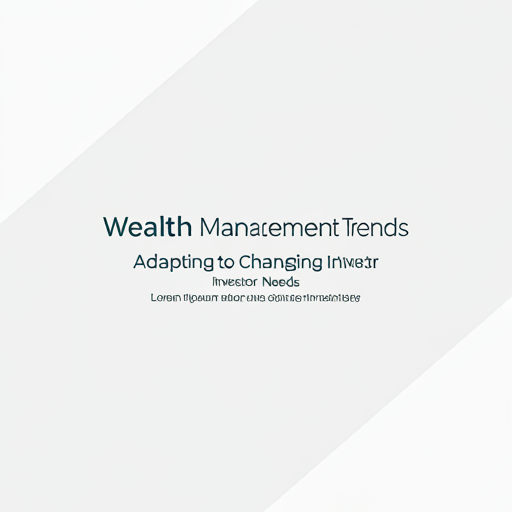Introduction to Wealth Management in the Cryptocurrency Era
The Evolution of Wealth Management
Wealth management has transformed significantly with the rise of cryptocurrency. Investors now seek diverse portfolios that include digital assets. This shift requires financial advisors to adapt their strategies. They must understand blockchain technology and its implications. Many investors are curious about these new opportunities. Cryptocurrency offers unique benefits and risks. It is essential to stay informed. Knowledge is power in this evolving landscape.
Impact of Cryptocurrency on Traditional Wealth Management
Cryptocurrency has introduced volatility into traditional wealth management. This volatility challenges established investment strategies. Financial advisors must now incorporate digital assets into their portfolios. Many clients are eager to explore these options. Diversification has become more complex yet essential. It is crucial to assess risk tolerance carefully. Understanding market dynamics is vital for success. Knowledge leads to informed decisions.
Understanding Changing Investor Demographics
Millennials and Gen Z: The New Investor Class
Millennials and Gen Z are reshaping the investment landscape. They prioritize technology and accessibility in their financial decisions. This demographic often favors digital platforms for trading. Many are drawn to cryptocurrencies and alternative investments. Their investment strategies tend to emphasize sustainability and social impact. Understanding these preferences is crucial for financial advisors. Adapting to their needs can enhance client relationships. Knowledge of trends is essential for success.
Institutional Investors: A Growing Influence
Institutional investors are increasingly entering the cryptocurrency market. Their participation brings significant capital and credibility. This influx can stabilize price volatility over time. Many institutions are diversifying their portfolios with digital assets. They often seek exposure to blockchain technology and its potential. Understanding institutional strategies is essential for advisors. Knowledge of their investment criteria can enhance client services. This trend is reshaping the financial landscape.
Technological Innovations Shaping Wealth Management
Blockchain Technology and Its Implications
Blockchain technology is revolutionizing wealth management practices. It enhances transparency and security in transactions. Many financial institutions are adopting blockchain for efficiency. This technology reduces costs associated with intermediaries. Additionally, it enables real-time settlement of trades. Advisors must understand its implications for client portfolios. Knowledge of blockchain can drive competitive advantage. It is a game changer in finance.
AI and Data Analytics in Investment Strategies
AI and data analytics are transforming investment strategies. They enable more accurate market predictions and risk assessments. Many firms utilize algorithms to analyze vast datasets. This approach enhances decision-making processes significantly. Advisors can tailor strategies based on real-time insights. Understanding these tools is essential for competitive advantage. Knowledge of AI can improve client outcomes. It ks a critical component of modern finance.
Regulatory Landscape and Its Impact on Investors
Current Regulations Affecting Cryptocurrency Investments
Current regulations significantly impact cryptocurrency investments. Regulatory bodies are establishing frameworks to ensure compliance. These regulations aim to protect investors from fraud. Many jurisdictions require registration of cryptocurrency exchanges. This increases transparency and accountability in the market. Investors must stay informed about these changes. Knowledge of regulations is crucial for risk management. It can influence investment strategies and decisions.
Future Trends in Cryptocurrency Regulation
Future trends in cryptocurrency regulation are evolving rapidly. Regulatory authorities are likely to implement stricter compliance measures. This will enhance investor protection and market integrity. Additionally, global harmonization of regulations may occur. Such changes could facilitate cross-border transactions. Investors should prepare for increased scrutiny. Understanding these trends is essential for strategic planning. Knowledge is key to navigating the regulatory landscape.
Investment Strategies for the modern font Investor
Diversification: Balancing Traditional and Digital Assets
Diversification is essential for modern investment strategies. Balancing traditional and digital assets can mitigate risks. Investors should allocate funds across various asset classes. This approach enhances potential returns while reducing volatility. Additionally, understanding market correlations is crucial. It helps in making informed decisions. A well-diversified portfolio can withstand market fluctuations. Knowledge of asset classes is vital for success.
Risk Management in a Volatile Market
Effective risk nanagement is crucial in volatile markets. Investors should employ strategies to protect their capital. Diversification across asset classes can reduce exposure to risk. Additionally, using stop-loss orders can limit potential losses. Regular portfolio reviews are essential for adjusting strategies. Understanding market trends aids in making informed decisions. Knowledge of risk tolerance is vital for success. It helps in crafting a resilient investment approach.
The Role of Financial Advisors in Cryptocurrency Investments
Educating Clients on Cryptocurrency Risks and Rewards
Financial advisors play a critical role in educating clients about cryptocurrency. They must explain both the risks and rewards associated with digital assets. Many clients are unaware of market volatility and regulatory challenges. Advisors should provide clear, concise information to enhance understanding. Additionally, they can help clients assess their risk tolerance. This assessment is essential for informed decision-making. Knowledge empowers clients to navigate the cryptocurrency landscape. It fosters confidence inward their investment choices.
Building Trust in a Rapidly Changing Market
Building trust is essential in a rapidly changing market. Financial advisors must demonstrate expertise and transparency. Clients often seek reassurance amid market volatility. Regular communication fosters a strong advisor-client relationship. Additionally, providing data-driven insights enhances credibility. Advisors should tailor strategies to individual client needs. This personalized approach builds confidence in investment decisions. Trust is the foundation of successful partnerships.
Conclusion: The Future of Wealth Management
Adapting to Investor Needs in a Digital World
Adapting to investor needs is crucial in a digital world. Wealth management must incorporate technology and innovation. Clients increasingly expect personalized, data-driven solutions. This shift requires advisors to enhance their digital capabilities. Understanding client preferences is essential for effective engagement. Regular feedback can guide service improvements. Knowledge of emerging trends is vital for success. Staying informed leads to better investment outcomes.
Embracing Change for Sustainable Growth
Embracing change is essential for sustainable growth. The wealth management industry must adapt to evolving market dynamics. Innovative strategies can enhance client engagement and retention. Additionally, integrating technology improves operational efficiency. Advisors should focus on long-term value creation. This approach fosters trust and loyalty. Knowledge is key to navigating change. Staying proactive leads to better outcomes.
